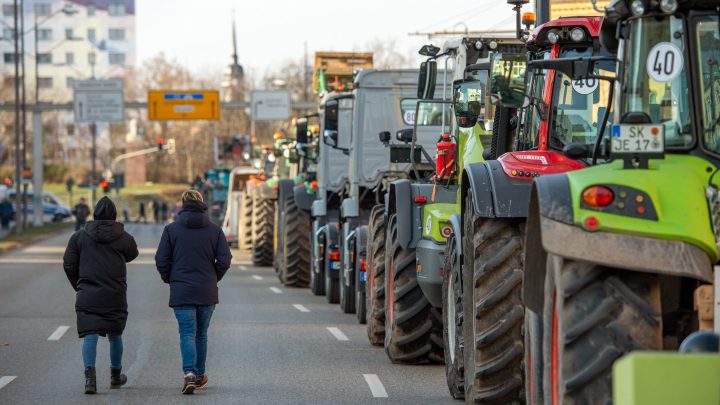
Farmers in Germany protest subsidy cuts with tractor blockades
Farmers in Germany protest subsidy cuts with tractor blockades

This story was produced by our colleagues at the BBC.
Farmers across Germany are blocking major roads and highways as part of a weeklong protest of the government’s plan to revoke key economic and agricultural tax policies.
The convoy of tractors and trucks gathered on roads in sub-zero temperatures, causing disruptions at Germany’s borders. The policies that farmers are protesting stem from Germany’s current budget crisis, which is heaping additional strain on an already stumbling economy. The BBC’s Leanna Byrne spoke with Brussels correspondent Jessica Parker. The following is an edited transcript of their conversation.
Leanna Byrne: So just give us the background to Germany’s budget crisis. Why is the government there facing a financial black hole?
Jessica Parker: Yeah, I mean, it’s a black hole of tens of billions of euros. And it is after, in November last year — there was this bombshell ruling by Germany’s Constitutional Court, which essentially declared that the government’s planned budget was unlawful. So they had to go back to the drawing board, try and find some savings, and this is where this all began in terms of the farmers protest, because they proposed to end farmers’ tax breaks on agricultural diesel and abolish this preferential treatment they get as well, in terms of vehicle tax. That last proposal has now actually been dropped because of the controversy. And the plan to an end tax breaks and agricultural diesel, that’s now going to be phased in rather than brought in abruptly. But it doesn’t seem to have really sufficiently assuaged farmers’ anger. So, this week, farmers are protesting up and down the country.
Byrne: And what were farmers saying in terms of those subsidy cuts? How would they affect farmers in Germany?
Parker: A lot of them were saying, it’s a bit like the straw that broke the camel’s back and that they feel that industry isn’t being properly supported, that it’s being squeezed by rules and regulation and red tape. And some as well sort of spoke out against green initiatives that might come from Berlin or might come from the European Union in Brussels as being part of, as they see it, the problem as well.
Byrne: Part of the conversation about these protests is concern of right-wing extremists infiltrating these protests. Is that a serious concern?
Parker: There are certainly examples and evidence of far-right groups turning up at protests or associating themselves with these demonstrations. And one campaign that we were speaking to yesterday were saying they actually changed their plans because they weren’t comfortable with the prospect that they knew was going to happen, of having a far-right group turning up. That being said, look, I think not all of those taking parts speak with one voice. There was a banner yesterday draped over one truck I saw that was explicitly in support of Alternative for Deutschland, which is, of course, the far-right party that’s doing very well in the polls at the moment. But it’s certainly true to say that there is a little bit of mixing in going on there with the wider politics of Germany and some of the trends that we’re seeing.
There’s a lot happening in the world. Through it all, Marketplace is here for you.
You rely on Marketplace to break down the world’s events and tell you how it affects you in a fact-based, approachable way. We rely on your financial support to keep making that possible.
Your donation today powers the independent journalism that you rely on. For just $5/month, you can help sustain Marketplace so we can keep reporting on the things that matter to you.











